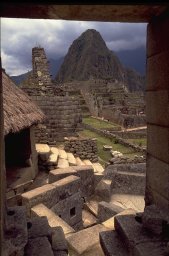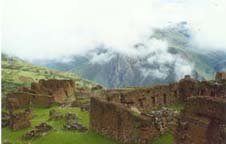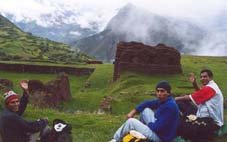
Join Ariana Svenson as she heads out into the Andean mountains, to
the ancient ruins of Small Cusco; the modest relation of the more famed Inca capital.
Legs like lead and lungs screaming in the thin mountain air, we
ascended a high pass and were rewarded with views into the ancient Inca capital of Cusco,
in Peru.
The Incas, a small tribe that expanded and conquered a good part of
South America, about five hundred years ago, are most commonly associated with The Inca
Trail and the ancient city of Machu Picchu.

Machu Picchu - by Michel
Stretching from present day Ecuador in the north and Chile in the south, the Inca
Empire was ruled by an Inca (literally the king) and his Quechua tribe that originated in
the Cusco area of Peru.
However, as we followed a track barely decipherable in the long yellow
grasses on the steep mountainsides we weren't on our way to the famed Machu Picchu,
instead to an another ancient city; older and more difficult to access.
We were on our way to Huchuy Qosqo (meaning 'Small Cusco' in the
Quechua language).

Huchuy Qosqo, by Ariana Svenson
The small Inca tribe of the Cusco region held their huge empire
together with an incredible system of communication.
A network of trails wound through the rich valleys of the Andes, on
through and around the craggy peaks. A message would take five days to reach Cusco from
the far north of the empire in Ecuador. It still takes about six hours to fly.
Thousands of foreign tourists converge on Machu Picchu each year and a
good proportion don their hiking boots for a hike along the Inca Trail. This route has
earned its reputation as one of the worlds great walks, leading over a series of high
passes that reveal spectacular mountain scenery on the Royal approach to Machu Picchu.
This is indeed an incredible trail, however for those with a sense of
adventure there are a myriad of 'Inca Trails' in the Inca Empire. Indeed, the Cusco
tourism industry, recognising the pressure placed on the traditionally popular trail to
Machu Picchu are encouraging tourists to follow other Inca Trails in the region.
Tambo Machay, a series of beautiful stone constructions and waterfalls
probably used by the Incas for divine purification, are the starting point for a two-day
walk through the mountains from the Cusco Valley to the ruins of Small Cusco.
Confronted by a cliff-like mountain towering over the sacred Inca
baths we follow meandering sheep paths up the pretty valley, spotted with potato crops,
flocks of sheep and the odd campesino (farmer) at his daily work. No children or porters
dressed up for the tourist cameras here.
A Peruvian friend is my guide and he is following the lay of the land.
I desperately hope that he knows where he is going as we take one cautious step after
another on this windswept mountainside in the middle of nowhere.
From the edge of our grassy perpendicular mountain we have
heart-stopping views out over dark green and blue rippled valleys. At times the goat
tracks give way to rock faces and we climb around, up and over. With adrenaline pumping,
it emerges to me why people find hiking so exhilarating.
Crossing a second pass we enjoy great views of alpine lakes, and
encounter big herds of llamas and alpacas. They start at our approach and run away with a
comical gait.
Sheltering under craggy rocks for lunch, thunder booms directly above
us - it feels as if we are up in the heavens with the storm. The cold came in as if
someone had opened a freezer door. With shoulders hunched and our eyes gazing at our feet,
we pressed on over a third pass to view the storm whirling close by, snow peppering a
nearby mountain.
Under-dressed for the occasion, I was convinced that I was going to
die of overexposure yet we came upon a group of colourfully dressed women and children
tending their llamas seemingly oblivious to the freezing sleet.
Ascending to the final pass marked by three Inca altars, through the
drizzle and low clouds, we were now clearly following an Inca trail, although the
intricate stones were treacherously wet.
Passing through a village of thatched alpine huts, the slippery track
led downwards into a spectacular ravine and passed through 'La Puerta de Leon Punca' (The
Door of the Canyon), a solid and incredible Inca construction perched about 200 metres up
on sheer cliff face. Hearts in mouth, we edged around the slimy cliff face never quite
seeing where the path led next.
A gurgling river led us past Inca ruins and as we dropped from the
bleak Altiplano to a milder landscape around 3,000 metres in altitude, where the smells of
the jungle began to waft through the air.
Emerging above the Sacred Valley of the Incas on a narrow stone ledge
we literally had the whole world at our feet.
Though a non-hiker, but driven by foul weather and sleet, I completed
the 24 kilometres to the age-old city of Small Cusco in one day. I was on top of the
world.
In a whole day's hiking, we had only chanced upon five campesinos and
as we camped alone near scattered ruins, with clouds engulfing our tent and obscuring the
holy mountains, this felt like true adventure.
At sunrise we gazed from the ancient windows of ruins over the
cloud-shrouded Sacred Valley - emotion filled our chests at the sheer ability of the
Incas. How did the Incas construct these cities high up on mountain faces with huge,
perfect carved stones; and how do these buildings stand firm today, despite the
earthquakes which shake this seismically active region?

Enjoying Small Cusco With Friends
Climbing to an extraordinary watchtower constructed on a rock with
sheer drops beneath the audacity of the Incas prompted my friend to repeat in wonder,
"The Incas had no fear!"
By Ariana Svenson.
Add a Business Listing - Add a Destination Guide - Add a Place to Stay.
 If you find Travel Notes useful, please take a moment to like us on
Facebook and share with your friends on social media. If you find Travel Notes useful, please take a moment to like us on
Facebook and share with your friends on social media.
Meta-Travel Blogging
- Top
Travel Blogs
- Travel Notes Directory.
|